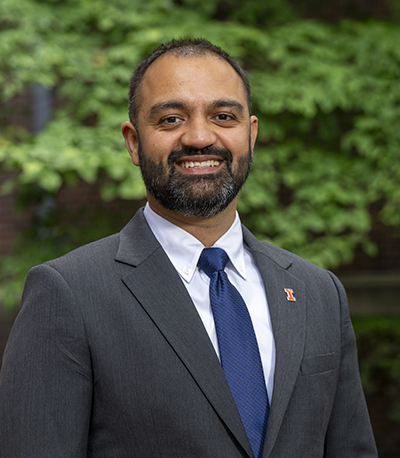Sep 3, 2024
Tyagi explores risk, reward of transparency in pharma industry
The pharmaceutical supply chain, an intricate web that creates new drugs for patients, operates largely under a veil of secrecy. But making it more transparent may have a chilling effect on innovation, according to Hanu Tyagi, who has joined Gies as an assistant professor of business administration.
“Clinical trials are largely opaque, but the push for transparency could be a double-edged sword,” said Tyagi. “Pharma companies are always experimenting with new drugs and are understandably excited about potential breakthroughs. But failures are often swept under the rug.”
This lack of complete information makes it difficult for patients, healthcare providers, and even regulators to fully understand the potential risks and benefits of a new medication. However, injecting transparency into clinical trials could be at odds with the novelty of drugs coming out of them because pharmaceutical firms may worry that their failures would become public.

Mitigating the trade-offs of transparency
“My research explores how to balance and better manage the safety-novelty trade-off and suggests ways to mitigate it,” said Tyagi. “While on the surface, transparency makes it safer for everyone to make their own decisions about taking a medication, in reality, it could prompt pharma companies to pursue fewer novel drugs.”
Tyagi’s dissertation shows how making interventions to improve the pharmaceutical supply chain can create unintended consequences. “It offers managerial interventions and policy tools to better manage the inherent trade-offs within global pharmaceutical supply chains.”
Tyagi said he always knew he’d be an academic. His father was a mathematician and his mother a chemist who both worked in the Department of Education for one of the large public universities in India. But because his undergraduate degree was in engineering, he knew he needed to get more business experience to pursue that career path.
Consulting for the pharmaceutical industry
Tyagi first worked for ZS, a consulting firm that specializes in the pharmaceutical industry that was founded by two Kellogg School of Business marketing professors and based in Evanston, IL. He worked for one of their first offices in India.
“I love that business is a confluence of math and social science, where you can be analytical and tackle social problems that affect society,” said Tyagi.
In 2012, Tyagi returned to school to earn his master’s in management from the Indian School of Business. He then joined Ranbaxy Labs, one of the largest generic manufacturing firms in the world, where he worked across manufacturing, sales, marketing, and business development on performance improvement initiatives.
When Ranbaxy was acquired, he followed his techie wife to the Middle East to work for EY-Parthenon, advising healthcare, pharmaceutical and private equity clients on their key strategy issues. He then returned to his alma mater as a research assistant on projects at the intersection of operations management and healthcare policy in emerging healthcare markets.
Studying supply chain in the US
In 2019, Tyagi and his family moved to Minneapolis for him to return to academia again. There earned his PhD in supply chain and operations from the University of Minnesota’s Carlson School of Management.
“The devil is in the details, and no disciplinary area confronts the devil as well as operations management,” said Tyagi.
Now, Tyagi brings his passion for exploring the dynamics of pharmaceutical industry to Gies. He said he was drawn to Gies because of its reputation of strong support for research and the opportunity to add to the work already focusing on pharmaceutical operations.
“The focus of my research is on ways to benefit the patient and I hope to collaborate with Gies and Illinois faculty to bring new thinking to the table,” said Tyagi. “This specialty creates a higher purpose for me as a professional and I am proud to be part of a college with a strong research agenda that’s making big bets on the future of healthcare.”
